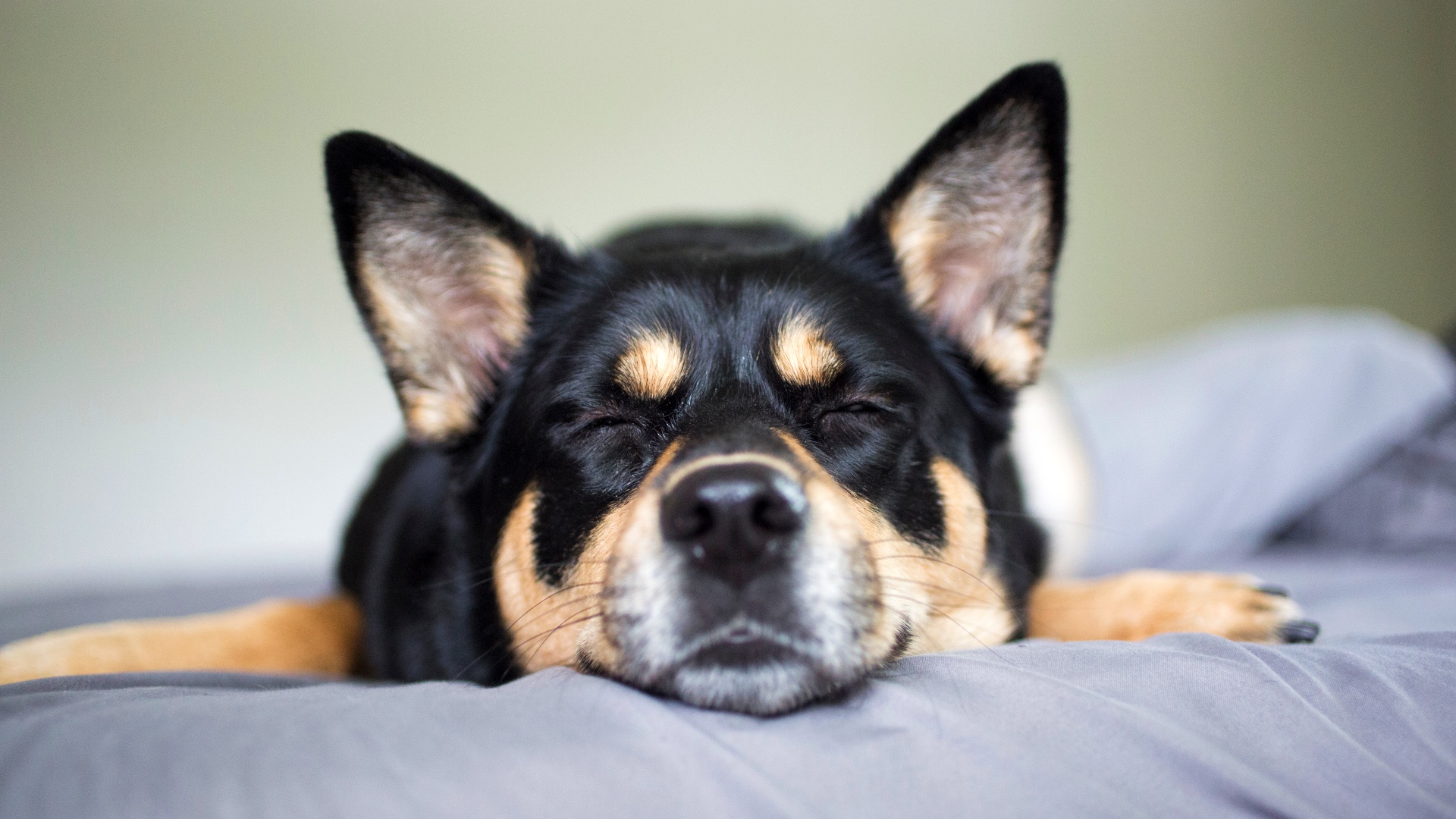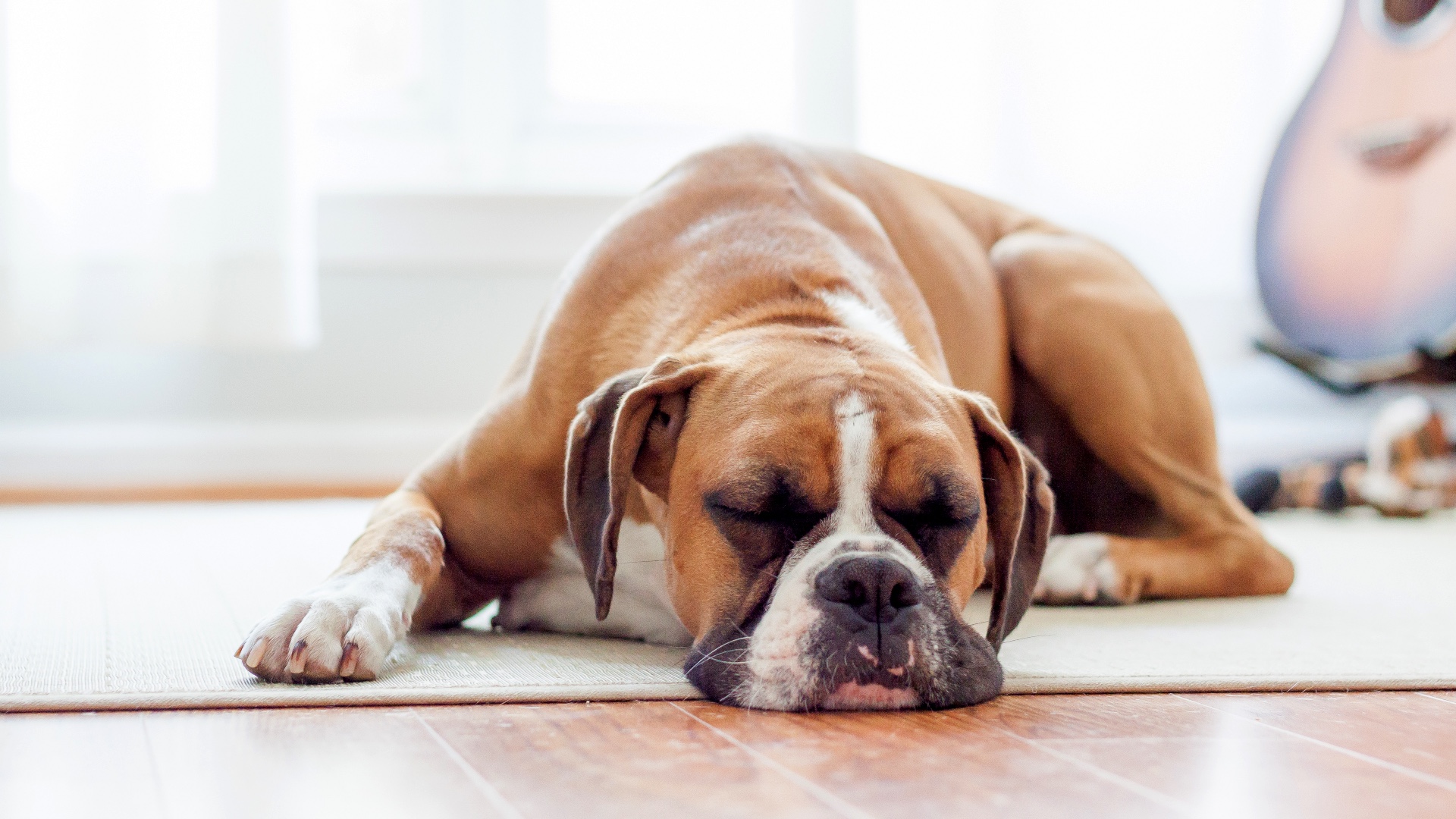Are dogs nocturnal?
We answer the question 'are dogs nocturnal?' and give you the rundown on how many hours sleep your pup needs and why they might be waking up at night

Are dogs nocturnal? A lot of pet parents are curious about their dog’s sleeping habits, especially since they seem to spend so much time with their eyes shut! Animals can be nocturnal or diurnal, depending on the time of day when they are most active. Some dogs spend a large proportion of the day curled up sleeping, (which is great if you invested in one of the best dog beds as it means you’re definitely getting your money’s worth out of it!), leading them to wonder if their dog is nocturnal.
The simple answer to this question is no. Most dogs are not nocturnal. The sleeping patterns of our pets are not as simple as these nocturnal or diurnal labels. Pets have adapted their sleeping patterns to the routines of their owners. To better understand this complex question, let’s take a closer look at what it means to be nocturnal and the sleeping patterns of dogs.
What makes an animal nocturnal?
A nocturnal animal is any animal that is more active at night. In the wild, this behavior is a result of an animal’s survival needs. Many predators find it easier to hunt their prey at night. In contrast, some animals are preyed upon by animals that are active during the day and find it safer to gather their food at night.
Although being nocturnal is a behavior, many animals have developed physical features and improved senses that make it easier to function in the dark. Many nocturnal animals have developed enhanced night vision. Animals such as owls have even developed larger eyes to improve their ability to see in the dark. Other nocturnal animals rely on their heightened sense of smell or sound to locate their food.
While nocturnal behavior is often passed down through generations, many animals will adjust their sleeping habits as their needs change. This is the case for domesticated dogs.
Dogs in the wild
As you may know, dogs are descendants of wolves. Wolves typically hunt their prey at night and are considered nocturnal. While you would have to go back thousands of years to trace most domesticated dogs back to the wolf, there are some much closer wild relatives. Some parts of the world have wild dogs and feral dog packs. Much like the wolves, these dogs are often nocturnal. Wild dogs work in packs to scavenge for food at night and spend their day resting.
Unlike their ancestors and wild relatives, domesticated dogs no longer rely on their hunting capabilities to survive. Pets rely on their owners for food. As the needs of domestic dogs changed, their sleeping patterns changed as well. Dogs no longer needed to be nocturnal to hunt for food. Instead, dogs take their sleep and activity cues from their owners.
Get the best advice, tips and top tech for your beloved Pets
How many hours a day do dogs sleep?

Dogs are considered social sleepers. In most households, dogs sleep during the night when everyone else is sleeping. Dogs with owners who work overnight jobs or have unusual sleep routines can adjust their sleeping patterns to match their owners.
Although dogs are social sleepers, you may have noticed that your dog frequently naps throughout the day. This is because your dog requires more sleep than you. Dogs’ sleep requirements are largely dependent on their age. The average adult dog sleeps 10-12 hours a day. Since this is more than the average human, your dog may need additional hours of rest when you are awake. Dogs will get most of their sleep at night while their owner sleeps. To get the additional hours of sleep, dogs may take multiple naps throughout the day.
Growing puppies and older dogs can require even more sleep. Puppies can sleep 18-20 hours a day. This extra sleep is essential for their growth and development. For older dogs, rest is necessary to help their body recover. Most dogs are considered senior citizens around eight years of age. As your pet continues to age, their sleep needs may continue to increase.
Your dog’s breed and size can also play a significant role in the amount of sleep they require. Large breeds, like Great Danes, often require more sleep than other dogs their age. On the other end of the spectrum, working dogs like Border Collies have higher energy levels and are less likely to sleep away the day.
Reasons your dog may be waking up at night
If your dog is frequently waking up during the night, there are a few things you should consider. The most common cause for this is that your dog is sleeping too much during the day. Schedule play-time throughout the day and make sure your dog is getting enough exercise. Creating a routine for your dog is essential. This can be particularly challenging in puppies.
When dogs are left alone during the day, they will often spend most of their time sleeping. This can cause problems and cause your dog to be more active at night. To avoid this, look for ways to keep your pet busy while you are away. Toys and food puzzles can be a great way to keep your dog stimulated. You may also want to consider a dog walker to give your dog some additional attention while you are away.
For some dogs, there may be a medical reason they are waking up in the middle of the night. As dogs get older, they can develop cognitive disorders. The symptoms of cognitive decline in dogs include changes in their sleep cycles. It is common for these dogs to become disoriented and show signs of irritability or aggression. Previously house-trained dogs can start to have accidents in the house. If you notice these changes in your dog, schedule an appointment with your veterinarian to discuss your concerns.
Catching z’s: The complexities of dog sleep
While their wild ancestors may be nocturnal, the domesticated dog is not. Over time, dogs have become social sleepers who take their sleeping cues from their owners. Dogs get the majority of their sleep at night when others are sleeping. However, your dog likely requires more hours of shut-eye than you, and it is not unusual for dogs to take frequent naps throughout the day. Changes in sleeping patterns can be a sign of medical issues in older dogs. If you have concerns about your dog’s sleeping habits, it is always a good idea to discuss your concerns with your veterinarian.
Dr. Elizabeth Racine is a small animal general practice vet covering all things pet health and wellness. Her special interests include veterinary behavior, nutrition, and internal medicine.
As a freelance writer, Dr. Racine has written content for major companies in the industry such as the American Kennel Club, Merck Animal Health, Bayer PetBasics, Elanco, and CareCredit. In her free time, Dr. Racine enjoys playing trampoline dodgeball, hiking with her beagle Dasher, and spending time with her three mischievous cats.

